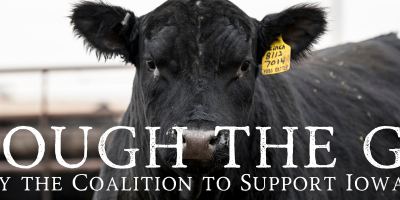CSIF Tips of the Month: September 2013
09-03-2013 in Through The Gate
Rules and Regs Highlight
Silage Piles and Other Feedstuffs: What You Need to Know
Fall is a busy time in Iowa, from harvesting crops, to putting up feedstuffs for the coming year, to baling stalks for bedding. Before chopping silage or other feedstuffs that will be stockpiled, consider potential environmental impacts.
Silage leachate, or seepage from silage piles, bags, bunkers and silos, is not only an economic loss that negatively impacts your bottom line, but also an environmental concern.
When silage leachate reaches surface water, it has the potential to remove enough oxygen to cause a fish kill. Additionally, the nitrate-nitrogen in silage leachate can also be harmful to groundwater.
The key is to minimize leachate production. A few tips include:
- Harvest below the maximum recommended forage moisture content (generally speaking, 60-70% moisture).
- Cover the forage pile and channel rainwater and snowmelt off of it.
- Keep the loading area clean of spilled feed.
- Keep open bunker silo faces vertical.
- Divert rainwater away from silage storage whenever possible.
For more information on controlling leachate from feedstuffs, read this Michigan State University Extension publication or call the Coalition to Support Iowa’s Farmers (CSIF) at 800-932-2436.
Forecasted Fall Rainfall: Prepare Your Farm
This year is one we won’t soon forget – from snow in May, to an extremely wet spring and then to a drought-like summer. Now some meteorologists are calling for significant rainfall again this fall. It is very important livestock and poultry farms be prepared.
Open feedlots need to continue to keep yards clean, especially before rainfall events. Make sure manure controls are working properly and will have enough storage capacity to handle large rainfall events.
Manure stockpiles and/or compost piles should be monitored for any potential runoff. Runoff needs to be contained and should never reach a road ditch or water source.
For a confidential, no-cost consultation to assess your farm’s situation, give CSIF a call at 800-932-2436.
Siting Tip
Doing Things Right: Be a Good Neighbor Before You Need To
Oftentimes you’ll hear the Coalition talking about the importance of communicating with neighbors before expanding your livestock or poultry farm. But, whether or not you have plans to grow the farm, establishing and maintaining good relationships with neighbors is vital to the long-term success of your business.
Don’t wait until you need something from your neighbors! Here are a few suggestions of ways to reach out to neighbors:
- Stop by and say “Hi!” Ask if they have any questions about your current farm operation.
- Go above and beyond. From helping move snow, to giving a gift of meat, to sharing a tool or piece of farm equipment, the small things are remembered and appreciated.
- Before applying manure, give a notice to neighbors that live near the site and the fields where manure will be land applied.
- Prior to weaning calves, let neighbors know there may be more noise than usual the next few days.
- With more farmers turning to aerial spraying and seeding, keep in mind not all people and livestock are comfortable with low-flying planes. Notify neighbors prior to planes flying. In particular, poultry can be particularly frightened, leading to piling and smothering of birds. If poultry farmers are made aware of when the planes will be flying over, he or she can be in the barn to help avoid death losses of birds.
- If hosting a field day this fall, or any event where there may be more traffic than usual on the road, communicate the hours of increased traffic and the reason for it with neighbors that may be impacted.
- If neighbors haven’t visited your farm recently, offer them a tour.
These are just a few suggestions; being a good neighbor doesn’t have to take a lot of time. It may require a little extra thought and planning, but the effort will be worth it in the long run.
Quote of the Month
“I contacted the Coalition because we were doing some work on a feedlot and needed a better idea what the rules and regulations were. The Coalition knew the right people to get ahold of and found out the right interpretation of the rules so we could finish our project and do it correctly. It wasn’t an easy answer and required some work to get that done. The Coalition has the resources to find the right answer, especially in situations where the answers aren’t clear and the rules aren’t necessarily black and white. They have the resources to help you find the right answer and get your project done and meet all the requirements.”
– Brian Feldpuesch, Grundy County cattleman
Recommended News

Through the Gate // May 2025
Stay updated with the Coalition to Support Iowa's Farmers. Discover events and more.
Read More
Through the Gate // April 2025
Stay updated with the Coalition to Support Iowa's Farmers. Discover events and more.
Read More
Through the Gate // March 2025
Stay updated with the Coalition to Support Iowa's Farmers. Discover events and more.
Read More